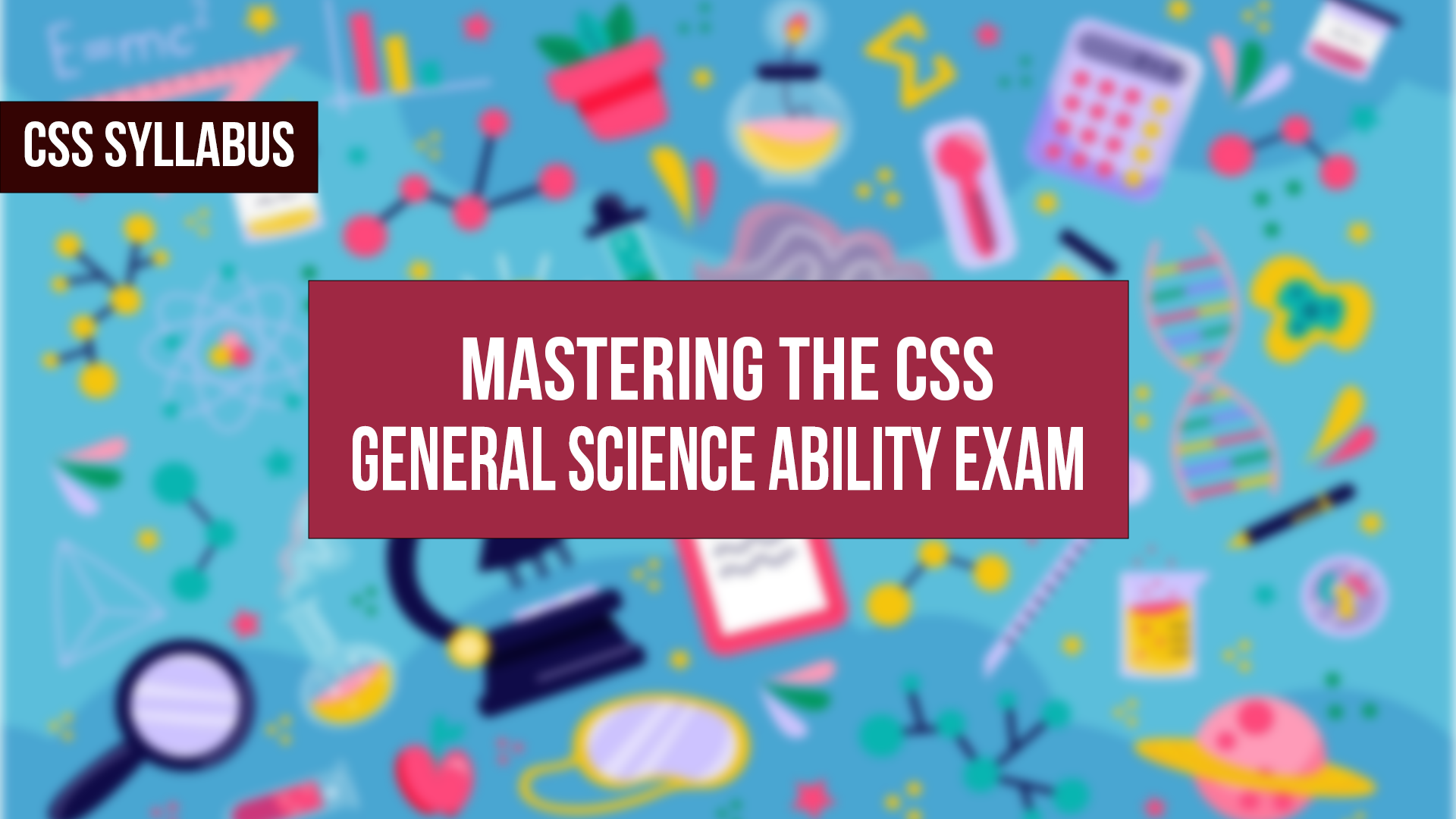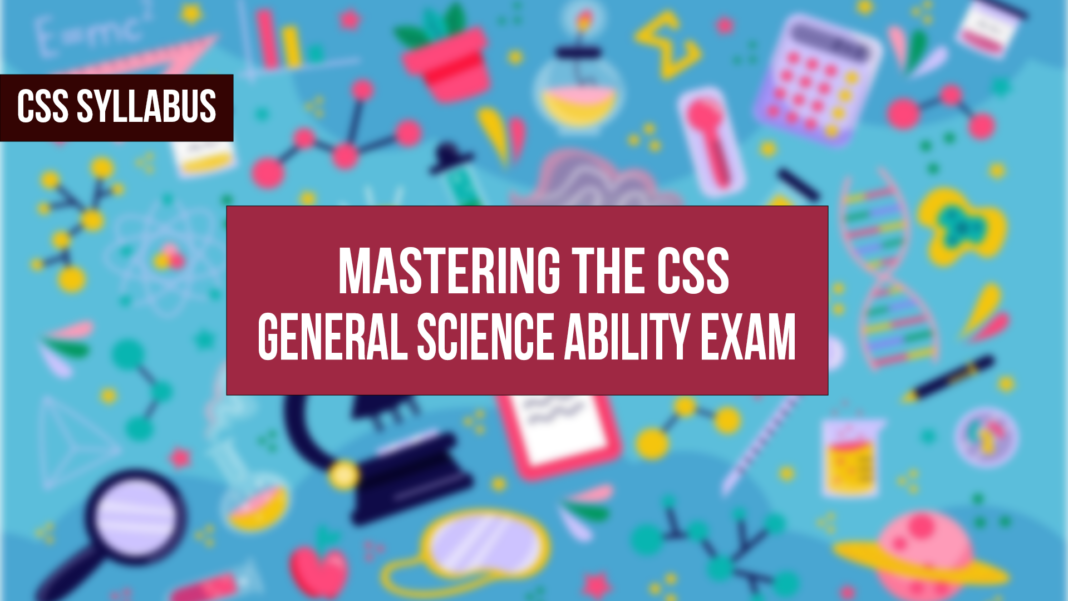Introduction
In the pursuit of acing the CSS General Science Ability Exam, knowledge is power. We, at [Your Company Name], understand the significance of comprehensive preparation. Our goal is to provide you with the ultimate guide to navigate through the CSS General Science Ability Syllabus. Let’s delve into the intricacies, ensuring your success in this competitive examination.

Understanding the CSS General Science Ability Syllabus
The CSS General Science Ability Syllabus is a roadmap to success. It covers a broad spectrum of topics, ranging from basic sciences to advanced applications. To gain a competitive edge, aspirants must delve into each sub-topic with precision and clarity.
CSS General Science Ability Syllabus
GENERAL SCIENCE & ABILITY (100 MARKS)
Part-I (General Science) 60 Marks
I. Physical Sciences
Constituents and Structure:-Universe, Galaxy, Light Year, Solar System, Sun,
Earth, Astronomical System of Units.
Process of Nature: – Solar and Lunar Eclipses, Rotation and Revolution, Weather
Variables (Global Temperature, Pressure, Circulation, Precipitation, Humidity) and
Weather Variations.
Natural Hazards and Disasters: – Earth Quake, Volcanic Eruption, Tsunami,
Floods, Avalanche, Travelling Cyclone (Tropical Cyclone, Middle Latitude Cyclone
and Tornadoes), Drought, Wildfire, Urban Fire. Disaster Risk Management.
Energy Resources: – Sources of Energy (Renewable i.e. LED Energy, Solar
Energy, Wind Energy and Non-Renewable Energy conservation and its sustainable
use.
Atomic Structure, Chemical Bonding, Electromagnetic Radiations.
Modern Materials/Chemicals: – Ceramics, Plastics, Semiconductors. Antibiotics,
Vaccines, Fertilizers, Pesticides.
II. Biological Sciences
The Basis of Life: – Cell Structures and Functions (Subcellular Organelles such as
Nucleus, Mitochondria and Ribosomes).
Biomolecules: – Proteins, Lipids, Carbohydrates and Enzymes.
Plant and Animal Kingdom: – A brief survey of plant and animal kingdom to
pinpoint similarities and diversities in nature.
A Brief Account of Human Physiology.
Common Diseases and Epidemics: – Polio, Diarrhea, Malaria, Hepatitis, Dengue
their Causes and Prevention.
New Model Concept of Producing BIO Fuel Method
III. Environmental Science
Environment: – The Atmosphere (Layered Structure and Composition), Hydrosphere
(Water Cycle, Major Water Compartments), Biosphere (Major Biomes) and
Lithosphere (Minerals and Rocks, Rock Types, Plate Tectonics).
Atmospheric Pollution: – Types, Sources, Causes and effects of major air
pollutants (COx, Particulate Matter, NOx, SOx, Tropospheric Ozone, Volatile Organic
Compounds, Dioxins). Regional and Global air pollution issues (Acid-rain, Ozone
Depletion, Greenhouse Effect and Global Warming). International agreements on air
pollution control (Montreal Protocol and Kyoto Protocol).
Water Pollution:- Types, sources, causes and effects of major water pollutants
(Synthetic Organic Chemicals, Oxygen Demanding Wastes, Plant Nutrients, Thermal
Pollution, Infectious Agents, Sediments, Radioactivity, Heavy Metals and Acids).
Drinking water quality and standards.
Land Pollution: – Solid waste management and disposal.
Role of Remote Sensing and GIS in Environmental Science.
Population Planning.
IV. Food Science
Concept of Balance Diet: – Vitamins, Carbohydrates, Protein, Fats and oil,
Minerals, Fiber.
Quality of Food:- Bioavailability of Nutrients, Appearance, Texture, Flavor, Quality
of Packed and Frozen Food, Food Additives, Preservatives and Antioxidants
Food Deterioration and its Control: – Causes of Food Deterioration, Adulteration,
Food Preservation.
V. Information Technology
Computer (Hardware & Software Fundamentals); I/O Processing and data
storage, Networking & Internet Standards, Application and business Software, Social
Media Websites. Information Systems. Fundamentals of artificial intelligence.
Telecommunications: – Basics of Wireless Communication (Mobile, Satellite,
Surveillance and GPS and Fiber Optic etc.
Part-II (General Ability) 40 Marks
VI. Quantitative Ability/Reasoning
Basic Mathematical Skills.
Concepts and ability to reasons quantitatively and solve problems in a
quantitative setting.
Basic Arithmetic, Algebra and Geometry (Average, Ratios, Rates, Percentage,
Angles, Triangles, Sets, Remainders, Equations, Symbols, Rounding of Numbers
Random Sampling
VII. Logical Reasoning and Analytical Reasoning/Ability
Logical Reasoning includes the process of using a rational, systematic series of
steps based on sound mathematical procedures and given statements to arrive at a
conclusion
Analytical Reasoning/Ability includes visualizing, articulating and solving both
complex and uncomplicated problems and concepts and making decisions that are
sensible based on available information, including demonstration of the ability to
apply logical thinking to gathering and analyzing information.
VIII. Mental Abilities
Mental Abilities Scales that measures specific constructs such as verbal,
mechanical, numerical and social ability.
Strategic Study Techniques
Success in the CSS General Science Ability Exam demands more than just rote memorization. Adopting strategic study techniques can make a significant difference.
Integrating Practical Applications
Link theoretical knowledge to practical applications. Understand how scientific principles are utilized in real-world scenarios. This approach not only enhances comprehension but also aids in solving complex problems effectively.
Regular Revision Strategies
Establish a disciplined revision schedule. Regularly revisit core concepts, focusing on weak areas. Utilize flashcards, mind maps, and self-assessment tools to reinforce learning.
Exam-Day Strategies
Effective time management and a calm demeanor on exam day are paramount. Implementing the right strategies can tip the scales in your favor.
Time Allocation
Allocate time wisely across sections. Prioritize questions based on your strengths, ensuring maximum marks in areas of expertise.
Strategic Answering Techniques
Adopt a strategic approach to answering questions. Focus on clarity, conciseness, and relevance. Use diagrams and charts where applicable to enhance your responses.
Additional Resources
Enhance your preparation with additional resources to stay ahead of the curve.
Online Learning Platforms
Leverage online learning platforms for interactive study sessions. Engage in forums and discussions to gain insights from experts and peers.
Conclusion
Mastering the CSS General Science Ability Exam is a journey that requires dedication, strategic planning, and continuous improvement. By following our comprehensive guide, you’re not just preparing for an exam — you’re paving the way for a successful career in the civil services. Good luck!

Editor Timesglo
Editor can be reached at editortimesglo@gmail.com






